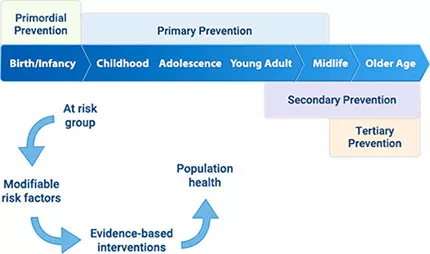Life Course Methodology Core (LCMC)
Leadership
Carmen R. Isasi, M.D., Ph.D.
Faculty
Karen A. Bonuck, Ph.D.
Yasmin Mossavar-Rahmani, Ph.D.
Brandilyn A. Peters-Samuelson, Ph.D.
Qibin Qi, Ph.D.
Aims
The overall goal of the LCMC is to support high quality type 2 translational research in diabetes across the lifespan. The life course perspective focuses on biopsychosocial and behavioral processes that individuals experience during particular periods in their life. It examines the intersection between social determinants of health and the biological processes that shape disease risk. Not only does the relative importance of specific factors vary across the lifespan, but exposures and behaviors in later life may mediate or moderate the effects of exposures and behaviors that occurred at younger ages. Thus, to optimally prevent the development of diabetes (primary prevention) and its sequelae (secondary and tertiary prevention), interventions must be appropriately targeted to the specific life course stage and must consider the downstream effects of exposures acting earlier in life. By identifying targets for intervention relevant to specific life span periods, the life course approach facilitates interventions for diabetes prevention or control within various age groups. This approach can also enhance the translation of efficacious interventions by ensuring that intervention strategies are developmentally tailored and that they address associated individual or environmental barriers.

Services Provider
We provide consultations to facilitate identification of key elements for translating interventions across the life course:
support for examining social determinants of health across the lifespan;
enhanced support for utilization of mobile health technology for study assessments;
consultation on the development of transition programs and other interventions to improve health outcomes among young adults with type 1 diabetes;
consultation on theory-driven translational interventions for childhood overweight, e.g., physical activity, weight control and family intervention.
Resources
The LCMC collaborates with the Einstein Institute for Clinical and Translational Research (ICTR) and other centers at Einstein to provide specific support for investigators.
Grant Acknowledgement
Users of Core Services are asked to acknowledge the support of the National Institute of Diabetes and Digestive and Kidney Diseases (NIDDK) grant that supports our Center in their publications and presentations: P30 DK111022.





